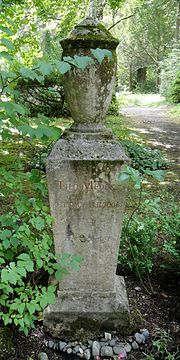Tilo Medek
| Tilo Medek | |
|---|---|

Medek's grave on the Nordfriedhof in Jena
|
|
| Born |
Tilo Gerhard Müller-Medek 22 January 1940 Jena |
| Died | 3 February 2006 (aged 66) Duderstadt |
| Education | |
| Occupation |
|
| Awards | |
Tilo Medek, originally Müller-Medek (22 January 1940 – 3 February 2006), was a German classical composer, musicologist and music publisher. He grew up in East Germany, but was inspired by the Darmstädter Ferienkurse. He composed radio plays and incidental music. His setting of Lenin's Decree on Peace led to restrictions, and after he showed solidarity with the expatriated Wolf Biermann, he also had to move to the West, where he composed an opera Katharina Blum based on Heinrich Böll's novel, and worked in education. He received international awards from 1967 on.
Müller-Medek was born in Jena, the son of the composer and musician Willy Müller-Medek (1897–1965) and his wife Rosa (1902–1976). He received musical training at the Jenaer Musikschule in violin, piano, improvisation and music theory. In 1957 he attended the 12th Darmstädter Ferienkurse in the western part of Germany where he took classes with Alexander Jemnitz, Luigi Nono, Hermann Scherchen and .
From 1959 to 1962, he studied piano with Kurt Johnen in Quedlinburg. He received his Abitur in 1959, and studied then at the Humboldt University of Berlin, musicology with Walther Vetter, Ernst Hermann Meyer and Georg Knepler. He also took courses in psychology with Kurt Gottschaldt, in art history with Karl-Heinz Clasen, in theology with Lieselotte Richter and in garden architecture with Willy Kurth. He studied at the same time composition with Rudolf Wagner-Régeny at the Deutsche Hochschule für Musik in East Berlin.
...
Wikipedia
